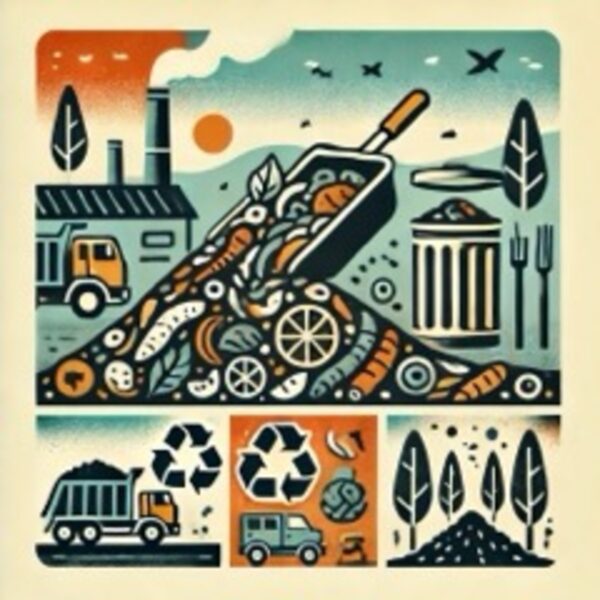Waste management is a major issue for all countries, especially in the Mediterranean region. Justine Viros decrypts waste management in Algeria, particularly in Kabylie, with Melissa Kanane, a Ph.D. in Ecosystem Protection. In this final part, she discusses their impact on the environment.
Melissa Kanane shares with us the results of her work on the waste management scheme in Algeria, the associated problems and solutions, and finally, their valorization.
Sequence 3 - Environmental Impact and Biodiversity in Relation to Waste
The Anthropocene is sometimes compared to a geological era, notably due to the omnipresence of plastic found on all continents and in all seas. This plastic comes from the waste generated by everyone's consumption. However, while we know how to produce it, its management and its impact in the form of waste are not yet fully controlled: 75% of all plastic ever produced on the planet is now waste. Apart from plastic, our consumption is responsible for a large amount of waste that affects our environment and biodiversity.
Waste and Environmental Pollution
The Mediterranean Sea is considered the most polluted sea in the world, this sad record is due to the accumulation of plastic waste originating 80% from land-based activities and being carried by rivers or the wind [1]. These wastes are sometimes visible (cigarette butts, packaging, etc.) and represent 10% of the plastic found in the Mediterranean. The remaining 90% is invisible, present in the form of microplastics [2].
On Earth, waste is also very present, littering beaches, roads, and ending up everywhere. Among them are household waste, depending on their management, they can be burned, stored, or recycled. They are sometimes thrown away before even reaching the trash can, but they are also found in open dumps or stored in technical landfills. In Algeria, like in many other countries, landfills do not always comply with the strict environmental standards necessary to limit their impact on the environment and prevent ecological disasters. The leachate, the liquid part that forms during waste accumulation, is toxic because it contains heavy metals and other acidic substances. When the sealing of landfills is defective, toxic substances can contaminate soils and groundwater, posing major risks to the environment and human health. Indeed, heavy metals, such as lead and mercury, persist in the environment for decades, thus affecting local fauna and flora. These problems are exacerbated by inefficient waste management, often driven by financial interests rather than environmental concerns.
Biodiversity and Contamination
Plastic waste has a devastating impact on marine fauna and flora. Each year, more than 1.5 billion animals die because of plastic waste [3]. Marine animals, such as fish, turtles, and birds, get trapped in plastic packaging or ingest microplastic fragments altering their movements and metabolisms. No space on Earth is spared, as scientists have found plastic even in unexplored seabeds [4]. The same goes for pollution from heavy metals linked to electronic waste or leachates, their impact embeds in an ecosystem, altering the pH and contaminating the biodiversity established in that location.
These pollutions not only directly kill animals and plants but also disrupt the food chain, affecting all ecosystems up to humans. The loss of species and the reduction of biodiversity lead to a decrease in essential ecosystem services, such as crop pollination, water purification, and pest control. Reduced biodiversity weakens the proper functioning of ecosystems, making them less resilient to climate change and other environmental disturbances [5].
Solutions and Prevention
In order to reduce pollution, many techniques are used. The first and most effective one is to limit waste production at its source by adopting a more local consumption, without packaging, favoring bulk purchases and cardboard packaging instead of plastic packaging. Then it is necessary to take part in waste management by sorting and recycling them as best as possible, promoting composting, etc. This also requires learning.
Indeed, education and awareness are crucial to change behaviors and promote sustainable practices. By educating the younger generations about the importance of waste management and environmental protection, we can hope for a long-term change in mindset. School programs, awareness campaigns, and initiatives from civil society are essential to achieve this goal. In Algeria, raising awareness among women and children plays a key role in this dynamic. Local associations note that by actively involving women and children, there is a multiplication of awareness efforts and a better implementation of waste management within households and communities.
Next comes the decontamination phase, which can be carried out by collecting wild waste, filtering rainwater, and developing innovative decontamination techniques. One can notably focus on phytoremediation, which involves using plants to decontaminate soils and waters polluted by heavy metals and other toxic substances [6]. Some plants have the ability to accumulate heavy metals in their tissues, thus allowing contaminated soils to be cleaned naturally and sustainably. This technique, although very expensive, is particularly promising for regions affected by contamination from landfill leachates.
Legally speaking, the states bordering the Mediterranean signed the Barcelona Convention in 1976, which is the main agreement on the environment in the Mediterranean that is legally binding. The objectives of this agreement are the protection of the Mediterranean Sea and the fight against pollution. It focuses on reducing marine pollution, sustainable waste management, and raising awareness among local populations. Despite better management and the implementation of stricter regulations, there is still much to be done in the Mediterranean regarding waste issues.
This can only be done with the populations. On both sides of the Mediterranean, numerous citizen initiatives are already underway. In Algeria, in the city of Tizi Ouzou, the association for composting and recycling is working on raising awareness and organizing waste collection events on the beaches. In France, the association Neede raises awareness among populations about environmental transition issues and waste management. Other initiatives such as Clean my calanques, Surfrider, or the Zero Waste movement help raise awareness about the issue of waste. These actors can be found on the ReMed platform initiated by the MerTerre association, which aims to bring together all organizations contributing to the reduction of wild waste in the Mediterranean.
The impact of waste on the environment and biodiversity is a complex and multidimensional issue that requires an integrated approach to be solved. Local and international initiatives, education and awareness efforts, as well as innovative techniques such as phytoremediation, are essential to reduce waste pollution and protect biodiversity. By working together, we can hope for a cleaner and more sustainable future for the Mediterranean and beyond.
Biography

Melissa Kanane: Doctor in ecosystem protection specialized in waste management and part-time lecturer at the University of Tizi-Ouzou in Algeria. Her work is dedicated to the quantification, identification, characterization, and valorization of household and similar waste.

Justine Viros: Scientist specializing in the Mediterranean forest and forest-atmosphere chemical interactions in the context of climate change. She currently holds a Research Engineer position within the Interdisciplinarity Mission of Aix-Marseille University where she is in charge of development mission for the Neede Mediterranean association.
References:
[2] https://www.ifremer.fr/en/microplastics-and-nanoplastics-what-impacts-on-marine-life
[4] https://www.ifremer.fr/en/news/plastic-waste-from-the-surface-to-the-seabed
Oliver, T. H., Isaac, N. J., August, T. A., Woodcock, B. A., Roy, D. B., & Bullock, J. M. (2015). Declining resilience of ecosystem functions under biodiversity loss. Nature communications, 6(1), 10122. https://www.nature.com/articles/ncomms10122
Jones, D. L., Williamson, K. L., & Owen, A. G. (2006). Phytoremediation of landfill leachate. Waste Management, 26(8), 825-837. https://www.sciencedirect.com/science/article/pii/S0956053X0500190X
[7] https://www.unep.org/unepmap/en/who-we-are/barcelona-convention-and-protocols
